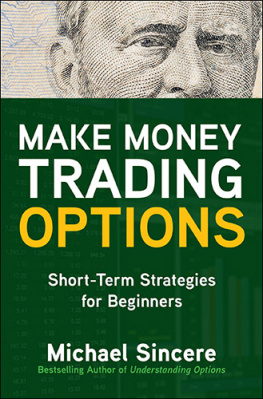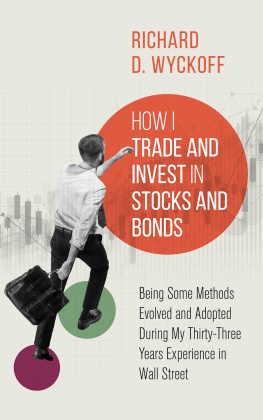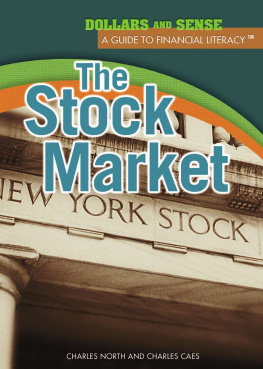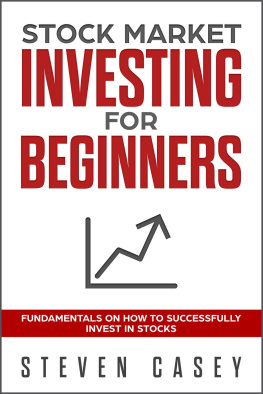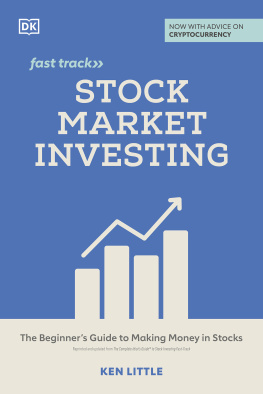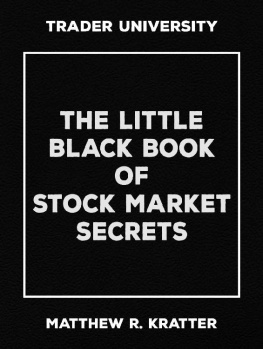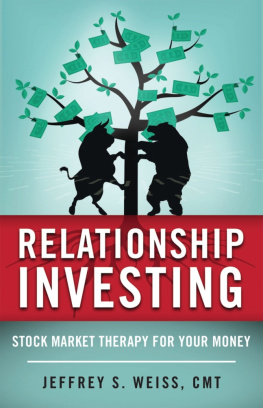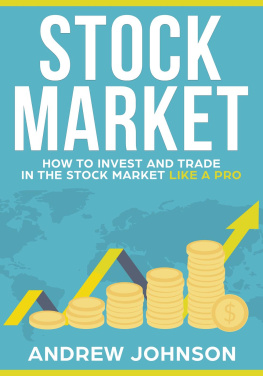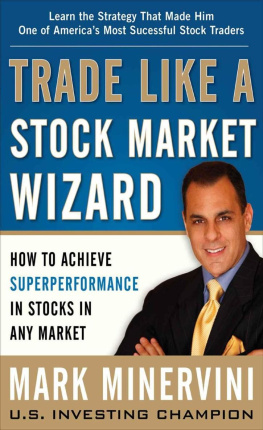Trade like A Stock Market Wizard
How to achieve super performance in stocks in any market
By
Cassandra Nauvall
Copyright 2020 by (Cassandra nauvall) - All rights reserved.
This document is geared towards providing exact and reliable information in regards to the topic and issue covered. The publication is sold with the idea that the publisher is not required to render accounting, officially permitted, or otherwise, qualified services. If advice is necessary, legal or professional, a practiced individual in the profession should be ordered.
- From a Declaration of Principles which was accepted and approved equally by a Committee of the American Bar Association and a Committee of
Publishers and Associations.
In no way is it legal to reproduce, duplicate, or transmit any part of this document in either electronic means or in printed format. Recording of this publication is strictly prohibited and any storage of this document is not allowed unless with written permission from the publisher. All rights reserved.
The information provided herein is stated to be truthful and consistent, in that any liability, in terms of inattention or otherwise, by any usage or abuse of any policies, processes, or directions contained within is the solitary and utter responsibility of the recipient reader. Under no circumstances will any legal responsibility or blame be held against the publisher for any reparation, damages, or monetary loss due to the information herein, either directly or indirectly.
Respective authors own all copyrights not held by the publisher.
The information herein is offered for informational purposes solely, and is universal as so. The presentation of the information is without contract or any type of guarantee assurance.
The trademarks that are used are without any consent, and the publication of the trademark is without permission or backing by the trademark owner. All trademarks and brands within this book are for clarifying purposes only and are the owned by the owners themselves, not affiliated with this
Table of contents
Introduction
Stock trading is the selling and buying of stocks in the stock market. When you purchase stocks of a company, you own a part of it. Trading stocks can be very difficult, and it needs experience and a clear understanding of the market. Before making any trading decisions, you should also aim to stay up to date with the latest news and trends. Market sentiment can change rapidly, and it takes perception and insight to be able to respond to this shift.
By staying up to date with new events and knowing how they affect markets, these skills can be built. When trading CFDs on the, there are different forms of trading orders that can be placed, including market orders, future orders, and stop orders. It is conducted at the current market price when a transaction is executed at "market order." When the instrument reaches a certain price, defined by you, you may also ask to open a spot. This is referred to as potential orders for (pending orders).
In addition, you can opt to manually close your positions or set stops so that the device closes them with stop orders automatically. If you set a limit stop (close to profit), your trade will close in order to help you lock profits at the rate you listed. You may also set a stop loss (close at a loss) to determine a closing rate in order to prevent further losses.
The stop will be activated until the selected rate is reached or passed (as sometimes the price will 'gap' and travel beyond the specified level), and the location will be closed automatically at the first available price. There is no guarantee that a place with a "close at a loss" set would close due to slippage at the exact price level stated. On the Plus500 platform, this feature is free of charge.
Traders should take the time to consider the basics of the stock they want to sell, as well as why the way they do and what causes those moves is pushed by markets. You should therefore know when to enter a trade as well as when to leave your place.
The timing of when to exit and enter your positions depends on many variables, like your general trading strategy, your risk-reward ratio, your risk tolerance, the volatility of the instrument, and any new developments in the relevant stock. To test your strategies and get some training using the platform, use the trial account, and then begin trading with real money until you feel relaxed.
You do not take considerable chances when you take the plunge. While not losing your money, this will help you set up your trading strategies. It's important to note while trading CFDs on a real money account that you can only trade with money that you can bear to lose. Make your trading plan, budget your finances before starting trading. To make better decisions, use graphs, market news because you can lose all with wrong decisions.
Chapter 1: Understanding Trade
Trade is a basic economic term, including the purchase and sale of goods and services, the price paid to the seller by the buyer, or the exchange of goods or services between the parties. Trade may take place among producers and consumers within an economy. International trade allows countries to develop markets that otherwise would not have been open to them for both goods and services. This is why an American customer can choose between a Japanese, German, or American vehicle. As a result of foreign trade, there is more competition in the industry and thus more affordable prices, taking the customer back home to a cheaper product. Trading in capital markets refers to the acquisition and sale of shares, such as the purchase of securities on the New York Stock Exchange floor (NYSE)
Trade broadly refers to transactions ranging in scope from the exchange of baseball cards between collectors to international policies setting protocols for imports and exports between countries. Trading is facilitated by three main types of exchanges, regardless of the complexity of the transaction.
Free trade between countries enables customers and nations to be open to goods and services that are not available in their own countries. On the international market, almost any kind of product can be found: food, clothing, spare parts, oil, jewelry, wine, stocks, currencies, and water. Services: tourism, finance, consultancy, and transportation are also traded. An export is a good or service that is sold on the world market, and an import is a product that is purchased on the world market. In a country's current account, imports and exports are compensated for in the balance of payments.
In addition to growing productivity, international trade enables countries to engage in a global economy, promoting foreign direct investment (FDI) opportunities, which is the sum of money that individuals invest in foreign companies and other properties. Thus, economies can, in principle, develop more effective and can become competitive economic participants more easily. For the receiving nation, FDI is a way of entering the country through foreign currency and expertise. This raises the level of employment and, in theory, contributes to increases in the gross domestic product. FDI provides market expansion and growth for the investor, implying higher sales.
A trade is a security exchange for "cash" in finance, usually a short-dated promise to pay in the currency of the nation where the 'exchange' is located: A financial instrument must be established by the State (which regulates it) and must be registered by the owner of the instrument with the State Regulator (who issues it). The owner, in this situation, is called: issuer of the financial instrument.


